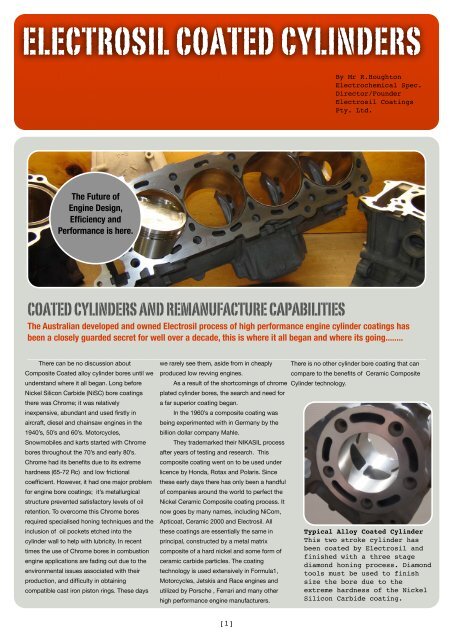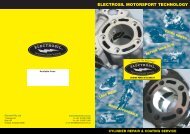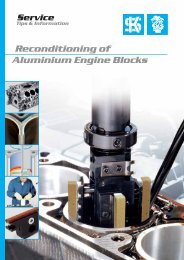ELECTROSIL COATED CYLINDERS
ELECTROSIL COATED CYLINDERS
ELECTROSIL COATED CYLINDERS
You also want an ePaper? Increase the reach of your titles
YUMPU automatically turns print PDFs into web optimized ePapers that Google loves.
<strong>ELECTROSIL</strong> <strong>COATED</strong> <strong>CYLINDERS</strong><br />
By Mr R.Houghton<br />
Electrochemical Spec.<br />
Director/Founder<br />
Electrosil Coatings<br />
Pty. Ltd.<br />
The Future of<br />
Engine Design,<br />
Efficiency and<br />
Performance is here.<br />
<strong>COATED</strong> <strong>CYLINDERS</strong> AND REMANUFACTURE CAPABILITIES<br />
The Australian developed and owned Electrosil process of high performance engine cylinder coatings has<br />
been a closely guarded secret for well over a decade, this is where it all began and where its going........<br />
There can be no discussion about<br />
Composite Coated alloy cylinder bores until we<br />
understand where it all began. Long before<br />
Nickel Silicon Carbide (NiSC) bore coatings<br />
there was Chrome; it was relatively<br />
inexpensive, abundant and used firstly in<br />
aircraft, diesel and chainsaw engines in the<br />
1940’s, 50’s and 60’s. Motorcycles,<br />
Snowmobiles and karts started with Chrome<br />
bores throughout the 70’s and early 80’s.<br />
Chrome had its benefits due to its extreme<br />
hardness (65-72 Rc) and low frictional<br />
coefficient. However, it had one major problem<br />
for engine bore coatings; it’s metallurgical<br />
structure prevented satisfactory levels of oil<br />
retention. To overcome this Chrome bores<br />
required specialised honing techniques and the<br />
inclusion of oil pockets etched into the<br />
cylinder wall to help with lubricity. In recent<br />
times the use of Chrome bores in combustion<br />
engine applications are fading out due to the<br />
environmental issues associated with their<br />
production, and difficulty in obtaining<br />
compatible cast iron piston rings. These days<br />
we rarely see them, aside from in cheaply There is no other cylinder bore coating that can<br />
produced low revving engines.<br />
compare to the benefits of Ceramic Composite<br />
As a result of the shortcomings of chrome Cylinder technology.<br />
plated cylinder bores, the search and need for<br />
a far superior coating began.<br />
In the 1960’s a composite coating was<br />
being experimented with in Germany by the<br />
billion dollar company Mahle.<br />
They trademarked their NIKASIL process<br />
after years of testing and research. This<br />
composite coating went on to be used under<br />
licence by Honda, Rotax and Polaris. Since<br />
these early days there has only been a handful<br />
of companies around the world to perfect the<br />
Nickel Ceramic Composite coating process. It<br />
now goes by many names, including NiCom,<br />
Apticoat, Ceramic 2000 and Electrosil. All<br />
these coatings are essentially the same in Typical Alloy Coated Cylinder<br />
principal, constructed by a metal matrix<br />
This two stroke cylinder has<br />
composite of a hard nickel and some form of<br />
been coated by Electrosil and<br />
finished with a three stage<br />
ceramic carbide particles. The coating<br />
diamond honing process. Diamond<br />
technology is used extensively in Formula1, tools must be used to finish<br />
Motorcycles, Jetskis and Race engines and size the bore due to the<br />
utilized by Porsche , Ferrari and many other extreme hardness of the Nickel<br />
high performance engine manufacturers. Silicon Carbide coating.<br />
[1]
Understanding the advantages of<br />
Electrosil coated bores.<br />
It is important to comprehend some of the<br />
advantages and disadvantages of the NiSC. In<br />
recent times there has been quite a discussion<br />
regarding the higher preliminary costs in repair<br />
of coated cylinder bores in comparison to the<br />
traditional cast iron liner cylinders. It must be<br />
understood that while a Nikasil cylinder is more<br />
expensive initially, over the lifetime of the<br />
cylinder bore it outlasts 10 fold any type of<br />
cast iron liner, as a further benefit of Electrosil<br />
coated cylinder bores, we have found an<br />
average of at least 2% to 5% horsepower<br />
gains over cast iron due to better lubricity of<br />
the coating. The lower coefficient of friction<br />
and superior oil retention properties of the<br />
silicon carbide help to achieve this. Heat<br />
transfer is also greatly improved because there<br />
are no dissimilar metals to dissipate heat<br />
through. The NiSC also is a lot harder, up to 10<br />
times, against cast iron.<br />
There are very few disadvantages when<br />
the coating is processed and applied correctly.<br />
As with all high tech processes there are some<br />
companies that will take a short cuts or simply<br />
do not apply the correct procedures resulting<br />
in a poor job; with delaminating, blistering,<br />
excessive build ups around port areas, with the<br />
potential of causing catastrophic engine failure.<br />
Electrosil only use the best available materials<br />
and our processes are constantly analyzed and<br />
maintained to prevent things going wrong.<br />
With an Electrosil coated bore when an<br />
Engine has a seizure, the likelihood of having<br />
to repair the cylinder is far less frequent. With<br />
an Iron bore it is more common to find damage<br />
and therefore boring and honing to the next<br />
oversize is required. A problem arises when<br />
there is no longer oversize pistons available or<br />
the racing class does not allow oversize bores.<br />
A coated cylinder can be recoated several<br />
times and taken back to the standard nominal<br />
bore size if required.<br />
When cylinders are received for recoating<br />
most companies follow the same<br />
procedure. Firstly the cylinder must be<br />
inspected and all parts removed or masked. If<br />
this is not done they will be dissolved in the<br />
stripping process. The cylinder then must be<br />
cleaned, degreased and chemically treated to<br />
remove the original coating. At this stage the<br />
cylinder is inspected for damage, Tig welded if<br />
required, bored, and precision honed to allow<br />
for the coating to be applied. Cylinders may<br />
also be bored out oversize at this stage to lift<br />
cubic capacity if required or any other<br />
modifications such as port timing adjustments.<br />
<strong>ELECTROSIL</strong><br />
Block Bored<br />
after Tig<br />
Welding<br />
Damaged Alloy Cylinders<br />
Alloy cylinders can be Tig<br />
welded and bought back to<br />
life by machining and recoating.<br />
This is quite a<br />
cost effective and<br />
environmentally sound way<br />
of repairing damaged<br />
engines.<br />
[2]
<strong>ELECTROSIL</strong><br />
Now the Electrosil Coating<br />
Technology can be applied....<br />
Plating the cylinder is not just a simple<br />
process where the cylinder is dipped in a tank<br />
and then pulled out like paint, magically being<br />
recoated. The Electrosil process is an<br />
extremely complicated procedure similar to<br />
Electroplating where a negative and positive<br />
charge is applied to the job. This creates a<br />
potential difference that causes metal ions to<br />
flow to the cylinder surface and encapsulate<br />
microscopic particles of Silicon Carbide and<br />
other additives as used by Electrosil. It must<br />
also be pointed out at this stage there is a<br />
huge range of variables and pretreatment<br />
possibilities for all differing alloys to be coated.<br />
This is where the Australian owned and<br />
developed Electrosil process differs<br />
dramatically from the competition. Electrosil<br />
use only the best German materials and<br />
employ unique additives such as Electrolube<br />
and other components engineered into the<br />
coating to improve performance and durability.<br />
Our pretreatment system has been tested time<br />
and time again, providing the best adhesion<br />
possible. When performed correctly the bond<br />
strength between the coating and the alloy can<br />
exceed 25,000psi. We have also found over<br />
the years that many cylinder coating plants<br />
have developed their own unique methods of<br />
coating application and more notably that<br />
some tend to take short cuts when it comes to<br />
material quality and wear resistance. This is<br />
one of the main reasons other similar coatings<br />
wear out so fast, and how cheap, inferior<br />
cylinders can be manufactured.<br />
It must be pointed out that cylinder<br />
coating is not a five minute job, and requires<br />
expensive precision equipment not only to<br />
process the cylinders but also to deal with the<br />
toxic trade waste that is produced. The<br />
Electrosil process has been developed over<br />
the past 15 years not only to provide the best<br />
cylinder coating but to do so in an<br />
environmentally sound way. The coating<br />
system has been developed to be a closed<br />
system to minimize drag out of the Electrosil<br />
coating chemicals. Once the cylinder has been<br />
coated it is removed from the system and<br />
cleaned of any residual coating solution and<br />
contamination. The cylinder then must be<br />
rough ground through the port and skirt<br />
chamfers before it is placed in an oven and<br />
heat treated to increase the coating bond<br />
strength at the metal interface.<br />
Once treated it is removed cooled and<br />
then beadblasted to brighten up the alloy<br />
exterior.<br />
At this time the cylinder has been coated<br />
to an undersize of the piston and will require a<br />
specialized honing process to size the bore to<br />
the correct tolerances.<br />
Cylinder Coating Stages<br />
Top:<br />
Typical Damaged/worn<br />
cylinder<br />
Centre:<br />
Cylinder coating removed and<br />
precision honed ready for coating<br />
application.<br />
Bottom:<br />
Electrosil coating applied and<br />
diamond honed to finish bore size.<br />
Electrosil<br />
Coating Close<br />
Up!!<br />
[3]
Honing the Electrosil Cylinder...<br />
Honing the coated cylinder is the last step<br />
in the process before the final quality check is<br />
performed. The honing of a coated cylinder is<br />
far more complex than for a conventional<br />
cylinder. A cast iron bore is first bored and then<br />
honed to provide a small size adjustment and a<br />
cross hatch for oil retention and ring seal.<br />
Coated cylinders can not be bored due to the<br />
hardness of the coating. If you tried it would<br />
either peel the coating off with alloy attached<br />
or quickly wear off and fry your boring tip. All<br />
coated cylinders must be first rough honed to<br />
clean up, then rough honed with a ground true<br />
diamond honing head and then finish sized<br />
with a fine diamond head. If a cylinder is not<br />
honed correctly; oil retention,excessive ring<br />
wear, loss of power or even premature failure<br />
can occur. The honing process must control<br />
parameters such as size, roundness, taper and<br />
surface finish. To ensure quality, precise<br />
calibrated measuring equipment is used which<br />
includes dial bore gauges, setting fixtures, ring<br />
gauges and surface measuring meters. Feeler<br />
gauges and calipers do not offer the accuracy<br />
required. Honing precisely removes material<br />
from the bore using abrasives stones and<br />
special custom honing heads to provide a<br />
round, straight bore. Normal cast iron bores<br />
are generally honed with silicon carbide<br />
stones. These stones, if used in an Electrosil<br />
bore, will only polish the surface and damage<br />
the silicon carbide surface. Therefore,<br />
diamonds must be used, and selected for<br />
depth of cross hatch, stock removal speed and<br />
bore geometry.<br />
The honing heads are<br />
generally an Eight stone<br />
hydraulic fed head that are<br />
driven by a heavy duty hydraulic<br />
honing machine. The machine<br />
must have spindle speed<br />
control as well as stroke<br />
speed and adjustable<br />
cutting feed pressure.<br />
Honing heads are required to<br />
be ground true due to the<br />
diamond honing stones.<br />
What now for Electrosil.....<br />
8 Stone<br />
Diamond Head<br />
Having been in the business for over 15<br />
years we have seen a lot of changes and<br />
rumors about coated cylinders. One has to<br />
keep reminding ourselves that this coating was<br />
developed by Formula 1 engineers and still<br />
today, there is no better alternative. If you race<br />
and want to win while keeping your engine at<br />
its peak, then there is no other coating to<br />
compare with Electrosil. Sure, you may be able<br />
to get it cheaper, but it won’t last as long or<br />
offer the same performance characteristics as<br />
the genuine Electrosil coating.<br />
Our company will continue developing<br />
our Electrosil coating and expand into broader<br />
markets. We stand by our product, and strive<br />
to maintain the best service, turnaround and<br />
quality you can buy, trust and rely on.<br />
Services:<br />
Electrosil specialize in the repair of all<br />
types of coated alloy cylinder bores. We<br />
have complete CNC boring machine and<br />
Hydraulic feed honing capability. Tig<br />
welding and machining services are also<br />
available to repair alloy cases, heads and<br />
frames. We are also able to rebore and<br />
sleeve cast iron bores, for both offroad<br />
and road bikes.<br />
General Electroplating<br />
• Chrome<br />
• Nickel<br />
• Zinc<br />
• Copper<br />
• Gold<br />
Full electroplating service available to all<br />
small parts for refurbishment or just to<br />
add that bling factor. Yes we can plate<br />
onto alloy!! Check out our website<br />
www.electrosil.com.au<br />
<strong>ELECTROSIL</strong><br />
7 George Crt,<br />
Briar Hill<br />
Victoria Australia<br />
3088<br />
PH: (03) 9435 7029<br />
FAX: (03) 9432 1995<br />
[4]




